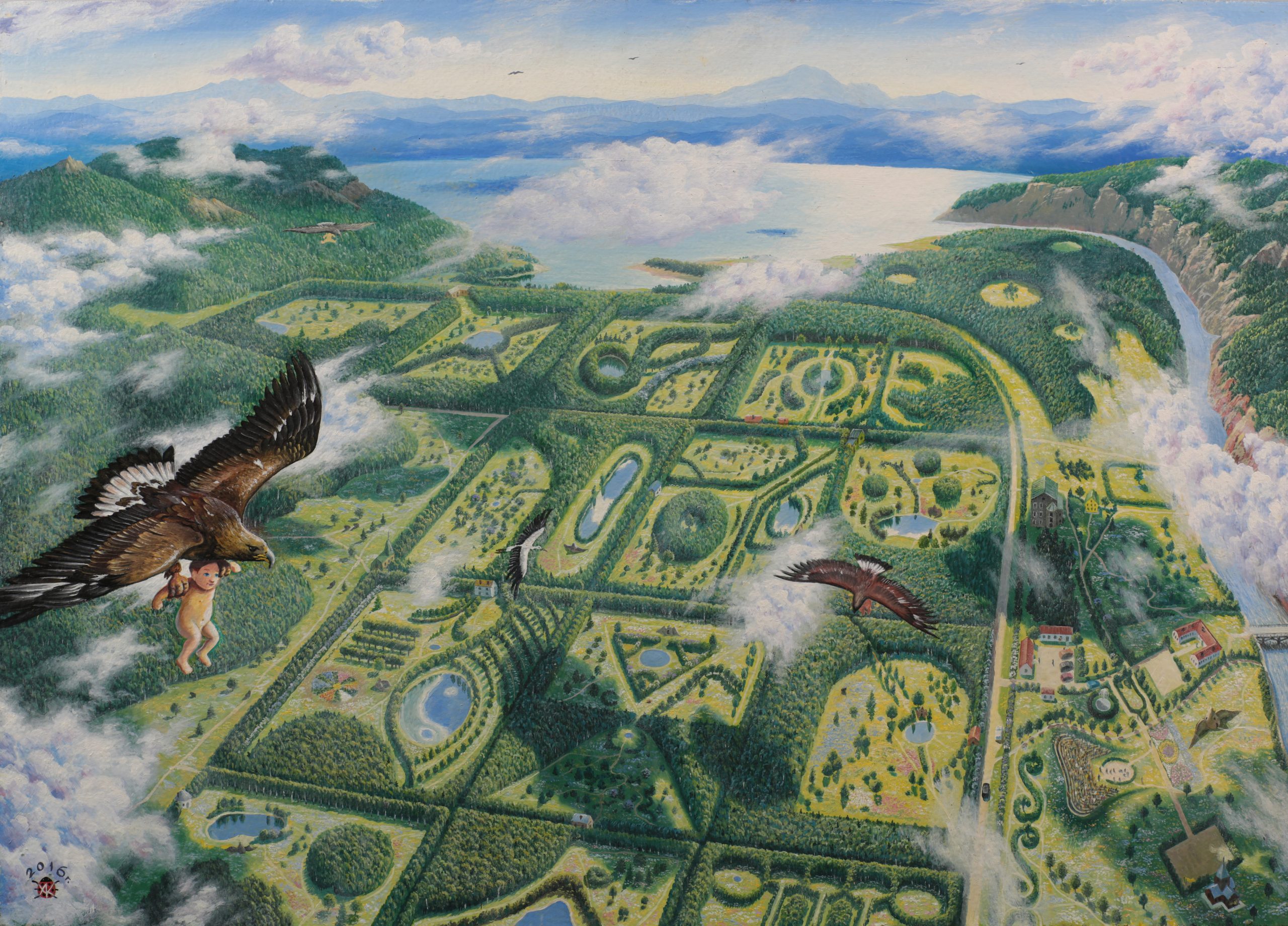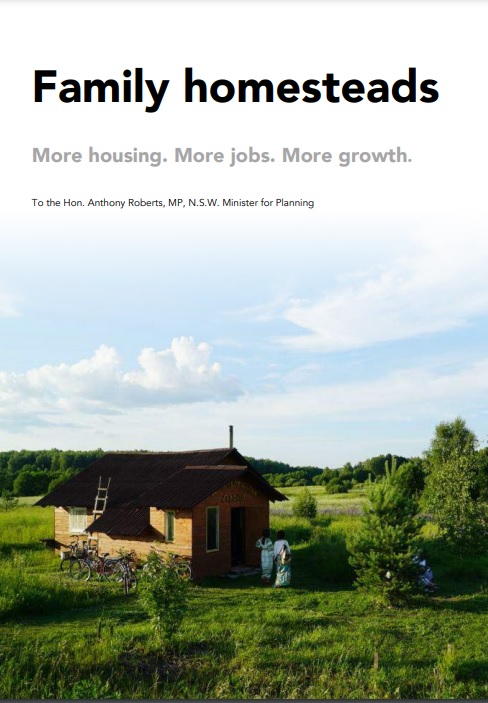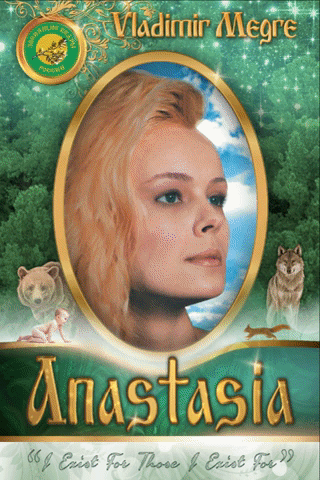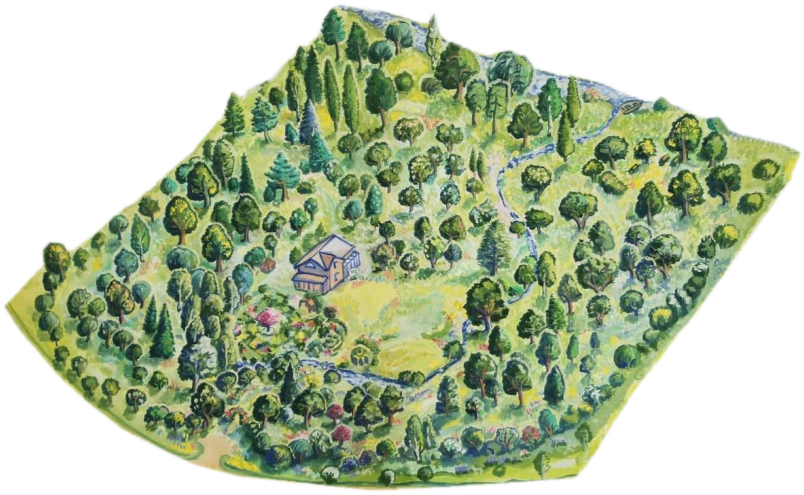


A Family Homestead is a plot of land at least 1 hectare in size (2.5 acres, 10,000 m2), surrounded on all sides by a passable laneway of at least 3m. Family Homesteads are mixed use residential, forestry, and agriculture, and are bordered by hedgerows rather than fences. The homestead is free of charge, indivisible, and can only be passed on by inheritance (not bought or sold). There is no taxation on any products of the homestead.
A Family Homestead Settlement is a group of family homesteads centred around common infrastructure such as a school, shop, medical centre, village hall, market square, water source (dam, bore, river), grazing or cropping paddocks, electricity substation, or other assets. Settlements have roads to allow vehicle access to each homestead.
Homestead: • house • workshop • vegetable garden • orchard • ½ – ¾ forest • hedgerow boundaries
Settlement: • around 100-200 homesteads • shared infrastructure • road network • community council with all equal and no centre of power
Family Homesteads are the central concept of the Ringing Cedars of Russia series by Vladimir Megre (written 1995-2010). The Anastasia Foundation reports 390 Family Homestead Settlements in Russia, and 136 outside Russia. In Russia the concept has been studied at universities and is supported at state and federal levels. There is also a political party to advance family homestead development.
Frequently Asked Questions
Where to get the books?
Buy eBooks direct from the author
Authorised edition, with photocollage covers (see below), is out of print in paper version. Only available as eBook via MegreLLC webstore.
This is due to black and painting book editions publishers trademarking the name “Ringing Cedars” in USA then writing cease and desist letters to the author’s distributors! (This was a company called Ingram, through which we bought the books at wholesale prices. A Megre employee told me these details by email in 2017.
Why, oh why, are these people — who claim to support the movement!? — (who shall neither be named nor linked), why are these people making legal threats against the books’ author!?
Why did the author write this? :
Now, I probably won’t be able to build the greenhouse around the perimeter of the homestead next year. I don’t have the money to do everything all at once. We’re hardly getting any royalties at all from America.
Basically, I don’t get what’s going on over there – they’re making some kind of changes to the books without my permission. The domain name “Ringing Cedars” in English belongs to somebody. And can you imagine – they even have the domain name “Vladimir Megre” there, and a site with that name, and it’s being passed off as my official site. But I have no connection to it whatsoever. Polina’s tried to register the trademark in my name, and they asked her to pay six thousand dollars.
I wouldn’t really care, but I feel bad for the readers. What are they being told on these sites? What products are being sold using those trademarks and logo? How can I sort it out? Where can I find the time to sort things out?
But I decided that in my new book I’ll give the name of a website where people can communicate directly with Polina. And to ask Polina to publish the new book in English, too. But so far I don’t know how to get it published in the English- speaking countries.
Why does the author now write this at the end of every book? :
AN APPEAL FROM VLADIMIR MEGRE TO HIS READERS
Several Internet websites now share ideas that are very similar to those of the main character, Anastasia, in the “Ringing Cedars of Russia” series.
Many of these websites purport to be official and use the name “Vladimir Megre”. They even answer letters in my name. In this regard, I feel it is my duty to inform you, dear readers, of my decision to create an official international website, www.vmegre.com/en/
This will be the only official source for correspondence in all languages from my readers all over the world.
By registering at and subscribing to this website you will be eligible to receive information on the dates and locations of upcoming reader conferences, as well as other information.
Our unified website will keep you, dear readers, informed about the Ringing Cedars of Russia movement throughout the world.
Yours truly,
Vladimir Megre
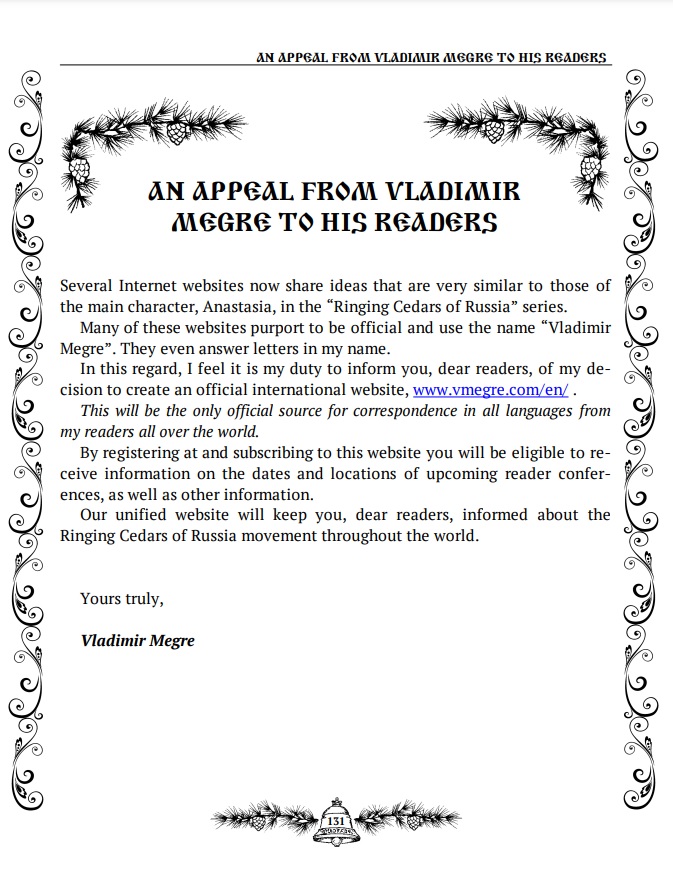
Family Homestead or Kin Domain?
Family Homestead is the translation chosen by Marian Schwartz, a renowned elder of Russian to English translation, in the authorised edition (Russian photocollage covers, see below). Let’s try to clarify everything here by performing a public translation of the phrase.
родовое поместье
First let’s look up the first word. The root of родовое is род. The suffix just tells us that it’s related to, or of the nature of, род.
verb
Open Russian
родя́сь, participle gerund present of роди́ться
· be born, come into being, arise, thrive
verb
роди́вшись, participle gerund past of роди́ться
· be born, come into being, arise, thrive
verb
родя́, participle gerund present of роди́ть
· give birth, give rise, bear
verb
роди́в, participle gerund past of роди́ть
· give birth, give rise, bear
noun
род
· generation, birth, origin, stock, family, race, kin
· (taxonomy) genus
· sort, kind, genre, style, branch
· (grammar) gender, class
adjective
родно́й
native, home, dear, darling, relatives, relations, kinsfolk, kin
noun
роди́тель
parent
verb
роди́ться
be born, come into being, arise, thrive
noun
ро́дина
native land, home, homeland, fatherland, birthplace
noun
ро́дственник
relation, relative, kinsman, kinswoman, kindred, kinsfolk
verb
роди́ть
give birth, give rise, bear
noun
родня́
relatives, relations, kinsfolk, kin, relative, relation
adjective
родово́й
ancestral, patrimonial, tribal, generic, gender
adjective
ро́дственный
kindred, related, congener, congeneric, allied, familiar, intimate
родъ (rod) – Pre-reform orthography (1918)
Etymology
from Old East Slavic родъ (rodŭ), from Proto-Slavic *rodъ, from Proto-Balto-Slavic *radás.Homophone:рот (rot)
Rhymes: -otNoun
род • (rod) m inan (genitive ро́да, nominative plural роды́, genitive plural родо́в, related adjective родово́й)
· generation, birth, origin, stock, family, race, tribe, lineage
о́т роду ― ót ”’rodu”’ ― of ageDescendants
→ Kildin Sami: ро̄дт (rōdt)Noun
род • (rod) m inan (genitive ро́да, nominative plural рода́, genitive plural родо́в)
· (taxonomy) genus
· sort, kind, genre, style, branchNoun
род • (rod) m inan (genitive ро́да, nominative plural ро́ды, genitive plural родо́в, related adjective родово́й)
· (grammar) gender, classмужско́й род ― mužskój rod ― masculine gender
же́нский род ― žénskij rod ― feminine gender
сре́дний род ― srédnij rod ― neuter gender
о́бщий род ― óbščij rod ― common genderRelated terms
Wiktionary
вы́родок (výrodok)monster, degenerate, black sheep, ‘exited from род‘
заро́дыш (zaródyš)embryo, foetus, (botany) germ ‘begin, advance род‘
поро́да (poróda)(science) breed, kind, species, sort, type
приро́да (priróda)nature ‘with род‘
роддо́м (roddóm)maternity home
ро́дина (ródina)homeland, motherland, native land
роди́тель (rodítelʹ)parent
роди́тельный (rodítelʹnyj)(linguistics) the genetive case
родни́к (rodník)spring, source, origin
родно́й (rodnój)native, dear
роднове́рие (rodnovérije)a particular group of Slavic neopagans ‘род-believers’
родови́тый (rodovítyj)well born
ро́дом (ródom)by birth, by origin
родство́ (rodstvó)relationship, kinship, affinity (family relationship through marriage of a relative), kin, consanguinity, cognation, connection, connexion, alliance, blood, propinquity, cousinage
ро́дственник (ródstvennik)relative, relation, kinsman (someone in the same family; someone connected by blood, marriage, or adoption)
рожа́ть (rožátʹ)to give birth, to bear, роди́ть (rodítʹ)to give birth to give rise to, to bear, to yield (of land)
сла́ва ро́ду (sláva ródu)(paganism) “glory to the Slavic race”, a greeting used by Slavic neopagans and nationalists.
сродни́ (srodní)akin (of the same kin; related by blood)
уро́д (uród)monster, ugly creature ‘not род‘
Translations of РОД
Google Translate
Reverse translations Frequencyhelp_outline Noun род, вид, класс, сорт genus род, вид, класс, сорт race раса, гонки, гонка, род, народ, бег kind вид, тип, разновидность, род, сорт, класс family семья, семейство, род, содружество generation поколение, генерация, образование, генерирование, род, порождение type тип, модель, разновидность, род, типаж, шрифт sort вид, сорт, род, разновидность, образ, разряд gender пол, род clan клан, род, клика species вид, разновидность, порода, род, класс kin род, родственники, родня, семья, родство, свойство nature природа, характер, сущность, натура, естество, род bloodline родословная, род stem стебель, стержень, ствол, основа, ножка, род kindred род, родственники, кровное родство, клан, сходство характеров order заказ, порядок, орден, приказ, распоряжение, род ilk род class класс, сорт, тип, категория, занятие, род house дом, жилище, театр, здание, палата, род name имя, название, наименование, фамилия, обозначение, род manner способ, манера, метод, стиль, образ действий, род blood кровь, кровопролитие, происхождение, родство, род, убийство strain штамм, напряжение, деформация, нагрузка, сорт, род style стиль, тип, манера, фасон, слог, род stock акции, запас, шток, инвентарь, фонд, род description описание, изображение, вид, род, сорт, вычерчивание stamp марка, штамп, печать, отпечаток, клеймо, род kidney почка, склад характера, тип, темперамент, характер, род series ряд, серия, цикл, группа, цепь, род
You can see our target word родовое there, as the related adjective of род. So what does род mean?The entire extended meaning of the word род has evolved over millennia of use among Russian and earlier Slavic, Baltic, Vedic people. So let’s analyse it by listing our observations.
- This is a big word. It appears often. It is the root of many words.
- No single English word can describe all of this.
Despite the challenge, let’s make an attempt.
род means the birthing, the family, the relations, the lineage. The parentage, the procreation, the chain of life from generation to generation. род is kin, род is clan, род is family, род is tribe. род is the native, the familiar, the homeland. род is the race, the kind, the kindred.
I did an experiment asking Russian Ringing Cedars readers to define род. They came up with various answers.
“Great Family”, just my suggestion
Kumar Alzhanov, Master painter of Ringing Cedars-inspired imagery
Rod for me is associated with a big tree. With powerful roots, thick crown and branches, stretching to an infinite height. The roots are our ancestors; we are the crown; thick twigs, small twigs, sprouts are our children, grandchildren, great-grandchildren, etc.
Ekaterina Poltoratskaya
Rod – these are people who take turns coming to life! A person is “po-rod-istvi”, who comes to life according to their Rod.
Vasily Filippov
If we are obliged to choose a single word to translate род, what would you say? Marian Schwartz chose the word “family”. And I agree. “Family” is also a big word, used regularly, including as the root of phrases like “family tree”, “family line”, “family land”. While род undoubtedly conveys a bigger, broader meaning than “family”, “family” is the closest match out of the available English words. “Kin” or “clan” would be in next position, also describing the similar concept from the Nordic or Brythonnic etymology instead of Latin. One limitation of “family”: Latin gave the connotation of a family of indentured workers, a broader household around a homestead. But in the modern usage for so many centuries, it’s no longer understood as a pejorative.
“Kin” is a much rarer word and is a slightly different part of speech. It is a collective, instead of countable, noun. We don’t say ‘the wedding crowd cheered as the two kins were joined’. But we could say, ‘families’, ‘family lines’, or роды.
Buy eBooks direct from the author

Written in 1995 by Novosibirsk businessman Vladimir Megre, the story traces his voyage as captain of a trading vessel on the Siberian river Ob. During a stop at a remote village, Megre meets an unusually beautiful and civilised young woman who promises to show him a rare and valuable tree—the Ringing Cedar. But Anastasia teaches Vladimir about much more than that. She gives practical advice and humbling lessons about love, relationships, raising children, gardening, animals, and transitioning to a stable, prosperous global civilisation.
First published with an advance from a print shop and sold by the author himself in a Moscow subway station, the book has now been translated into 20 languages and sold more than 10 million copies worldwide. Anastasia’s ideas have been enthusiastically taken up among everyday Russians, including politicians, professionals and university professors.
“Anastasia” is a guide to retrieving our soul’s purpose, and the book setting the path to a beautiful future. A prosperous, happy and love-filled civilisation is now closer than ever before!
Vladimir returns to Novosibirsk and goes to the gritty streets of Moscow, struggling to understand and communicate his experience with Anastasia in the forest. Pulling his life back from the brink of collapse, Megre gets help at just the right time, ensuring that Anastasia’s message is accurately recorded.
Recounting more of his three days with Anastasia, Megre suggests an all-Earth holiday on 23 July, Dachnik Day, which is now celebrated in parts of Russia. He recalls the Christian invasion of Celtic Europe, and reveals the ancient method of preparing medicinal cedar oil.
Anastasia’s grandfather explains how Anastasia healed Vladimir with cedar oil, during his earlier illness. Grandfather explains the appearance of a ball of light energy next to Anastasia when she was a young girl—the ball of energy she calls “Good”. He cites a poet whose songs seem to confirm what others had suspected: the energy is an appearance of the intellect of nature, or the Creator.
The book ends with an appeal to Russians to respect and honour their own local sacred sites rather than travelling to see foreign ones, an idea which could apply equally in every country of the world.
Vladimir returns to Anastasia’s taiga glade for a second time, and meets his son. Anastasia proves the effectiveness of her child raising system—no system at all. The forest home demonstrates exactly how carefully arranged elements of nature can cradle a baby human and provide for their every need. Even a bear as a nanny! She explains how a mother can pass information and good feelings when breast-feeding, and the power of human thought to shape a beautiful reality.
Vladimir travels to the Caucasian dolmens near the Black Sea in southern Russia, reigniting an interest in these ancient monuments among local people and tourists alike. He visits a nature-based forest school in the town of Tekos and talks with the children about Anastasia, the forces of light, and the good energy of stars. A film about the school at Tekos is available to watch online.
Anastasia portrays the creation of the Universe, the Earth and all of nature. The beautiful images of love, the Creator and the pristine cosmos offer a divine vision without any religion, where every person has direct access to the rhythm of the universe and its energy of life. This is the book to reawaken the infinite, eternal energy of creative dreams.
Recounting a story from ancient Egypt, Anastasia describes how her forefathers observed the degeneration of the human population and inserted imagery to ensure the completion of a harmonic planetary society in the present day. She dismisses the threat of alien invasion.
Anastasia reasserts human sovereignty over the Earth through the fundamental family unit, a natural home made of living creations: the Family Homestead. Together, she and Vladimir create a home in their thoughts, complete with a living fence, forest, gardens, comfortable shelter and a large variety of useful plants and animals, thereby initiating a way of life that is at once very ancient and entirely modern, accessible to every person on the planet.
The Family Homestead preserves love between parents and children, connects us to the Earth and nature, and guarantees the flourishing of a new civilisation, a planetary dimension of love that radiates good light throughout the universe. There are currently 526 settlements of Family Homesteads registered with the non-profit “Anastasia” fund for culture and creative support.
Anastasia portrays stunning imagery of future Russia as the wealthiest and most powerful nation state, an example to others. Hundreds of millions of tourists flock to Moscow to witness the clean air, pristine river water, and experience the spirit of great creation in the Russian homelands.
Megre highlights critical shortcomings in the eco-village movement and confirms Anastasia’s predictions about the eternal nature of Family Homesteads with real examples in modern Russia.
Anastasia explains how military force will be neutralised by the children of Russia’s new settlements, and offers glimpses of the burgeoning new civilisation. So beautiful and enlightened are these new Russian communities that foreigners are kept at a safe distance lest they fall into depression at the realisation of their wasted technocratic lives.
Megre discusses proposals for making Anastasia’s vision a reality and outlines the process already undertaken by numerous groups in Russia for establishing Family Homestead Settlements.
Megre makes his third trip to the Siberian taiga and talks with his growing son. The young boy tells his father that the ninth book of the series shall be an eternal, living book—the paradise homesteads created by the people whose souls have touched the divine. He explains his unique perspective on love, and helps expand the growing love between his parents. His purpose in life? To find his Universe Girl and make her happy. According to Volodya, every girl has the Universe inside of her.
Anastasia tells the story of humanity, billions of years of human civilisation on Earth. Through stories of our Vedic ancestors, she illustrates the blissful life of the golden ages and describes the rituals of nature that ensure the eternal presence of love in our communities. The Vedian school, made up of natural, living creations and interactions, prepares a young couple for the ultimate test: to create the perfect homestead for their family.
Anastasia explains why dark forces attack the Ringing Cedars books, and reveals the tactics of the high priests of the planet Earth, including her late great-grandfather, which have kept humanity inside a field of artificial information, separate from nature. She asserts that people who create Family Homesteads will correct the situation, letting a beautiful new society of nature prevail.
With the aid of Anastasia’s ideas, Megre illustrates the power of human thought to shape our collective destiny and offers practical techniques from Anastasia’s grandfather for optimising our mental capacity. The priests of the Earth realise that nothing can stop Anastasia’s visions from becoming a reality as she reveals the secret of divine nourishment to the general public.
Anastasia tells the censored history of the Christian invasion of Russia, presenting unique information about our forebears’ pagan civilisation that is not widely available elsewhere. She portrays the vivid celebrations of the Vedic-age Rus and explains how they were conquered by the priests’ dark ideas, tracing the modern age to the origins of Judaism and Christianity, and proposing a peaceful way to neutralise harmful programs and return prosperity to the Earth.
Megre shows how Family Homesteads can repair life for orphans and convicts, and instil new consciousness in the population. The new path of development provides our leaders with a place to make informed, rational decisions for the benefit of society.
8 part 1. The New Civilization
Vladimir visits Anastasia for a fourth time, and outlines yet more practical measures for living closer to the nature that surrounds us, to improve our health, have more joy and more love. Their young son asks his father for a baby sister to take care of his animals once he becomes an adult, and executes a three-day healing regime to bring his father to optimal health before the birth. He demonstrates the power of natural herbs, exercise and living water.
Anastasia relates the origins of democracy and money as means of enslavement through the illusion of freedom, and creates the conditions for the transformation of the United States. In the future, a New York billionaire is touched by the energy of love, and devotes his resources to found a great precinct of Family Homestead settlements in Texas.
Vladimir writes a letter to the president of Russia, prints a letter from a German reader, and drafts a piece of legislation requiring each parliamentarian to live among the people in Family Homestead settlements. The law also provides land to young couples to make their own Family Homesteads, an idea which has since become a reality. A federal Russian law now guarantees a free plot of land for any Russian citizen or naturalised foreigner, starting with vacant land in the Far East regions.
Vladimir portrays the sad lack of love in modern relationships compared with our Vedic-age forebears. Together with Anastasia and her grandfather, he investigates the nature of love and how to ensure its eternal presence in our families.
Evidence from Russia’s archaeological sites emerges to support Anastasia’s version of history, suggesting that primitive cave men were survivors of global catastrophes, and that the historical norm over the millennia is in fact the recurrent blossoming of human population, civilisations striving for permanent harmony with nature—a goal we are destined this time to complete.
Anastasia recounts the story of a young girl in ancient Russia who falls in love with a boy. Treated as a revered guest in the family, the great energy of love propels the girl to astronomical beauty and virtue, reinforcing the natural law that true love can’t help but find its response.
Through the history of one family, Anastasia outlines the ancient Rites of Love—courtship, marriage and raising of children, as well as the three planes of conception which should all take place on the Family Homestead, the alignment of thought, the material creation, and the birth into a dimension of love, as well as the rituals for successfully forming a family after having had other partners. In the future, the ancient lovers are reincarnated on Earth, to meet amid the beauty and enthusiasm of a Russian courtship gathering.
Vladimir visits Anastasia for a fifth time, meeting his baby daughter in the resplendent beauty of her perfect natural environment. Anastasia recounts the story of the little girl’s previous life, in a Russian nation at the beginning of the last ice age. As the people flee the encroaching ice, the little girl turns from her family, preferring to die with her homeland than abandon it.
Anastasia is able to sense the visions of Good and Bad that appear to the youngster in the last days before she falls into her final sleep, revealing how both energies work for the ultimate perfection of our habitat, and how we might most beneficially relate to them. Then, Anastasia reveals the purpose of life: to Perfect the Dwelling Land.
Megre portrays the lunacy of modern life and writes a Family Homestead declaration inscribing his intentions to perfect a small piece of our great Earth, encouraging us to do the same. Anastasia disposes of the 2012 doomsday prophecies by announcing that she has cancelled the predicted hell, and also encourages us to follow suit.
Young Volodya helps his father solve the problem of soggy clay soil at his homestead, and in doing so invents an original technique to teleport a complete piece of the environment to a new planet, thereby ensuring the eternal blossoming of earthly creation, spreading in love through the cosmos to infinity.
The following message appears at the end of the authorised edition of the books:
AN APPEAL FROM VLADIMIR MEGRE TO HIS READERS
Several Internet websites now share ideas that are very similar to those of the main character, Anastasia, in the “Ringing Cedars of Russia” series.
Many of these websites purport to be official and use the name “Vladimir Megre”. They even answer letters in my name. In this regard, I feel it is my duty to inform you, dear readers, of my decision to create an official international website, www.vmegre.com/en/
By registering at and subscribing to this website you will be eligible to receive information on the dates and locations of upcoming reader conferences, as well as other information.
Our unified website will keep you, dear readers, informed about the Ringing Cedars of Russia movement throughout the world.
Yours truly,
Vladimir Megre
Have you read the right books?
A distorted translation of родовое поместье (family homestead, ancestral estate) was circulated in the 2000s in an attempt to confuse readers and defame the Ringing Cedars movement: “kin domain”. Read more
The inaccurate translation has deprived English-language readers of a full connection with the books’ information. Read more
This website aims to develop an integral network between English-language readers and worldwide Ringing Cedars and family homestead movements based in Russia.
Родовое Поместье
Family Homestead
Звенящие кедры России
Ringing Cedars of Russia
Анастасия
Anastasia
На Земле быть добру!
On the Earth will be Good!

